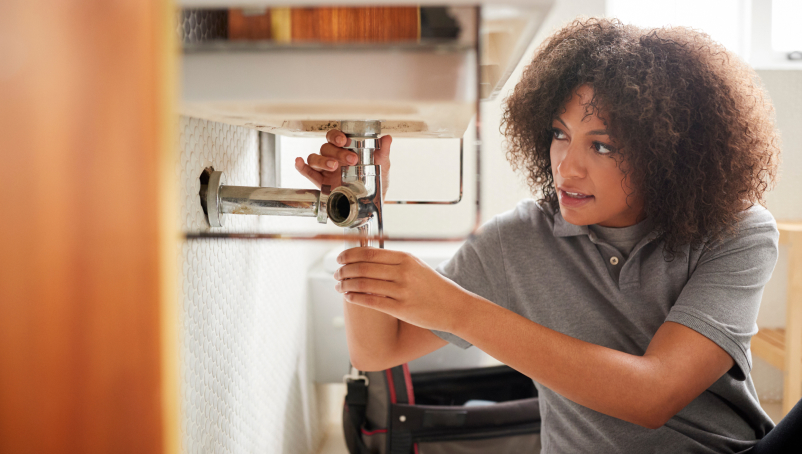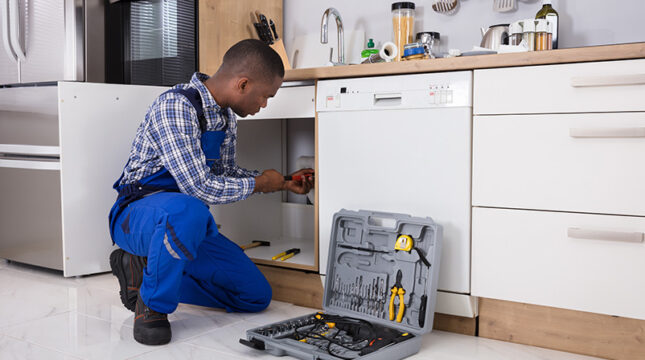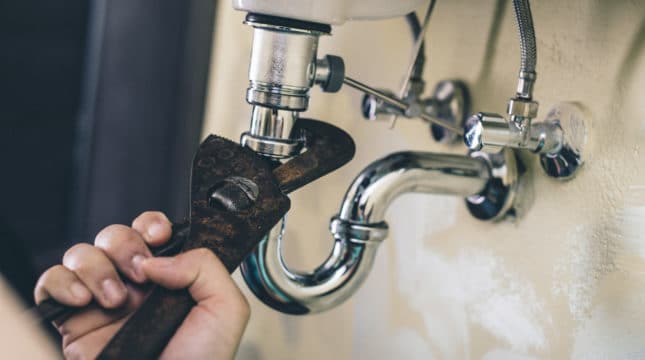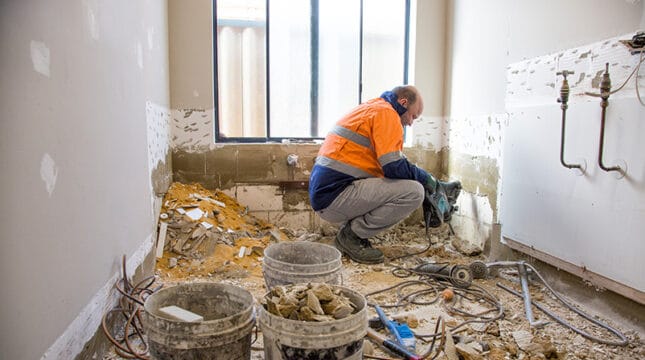Washington State plumbing license: Is it required?
Yes, you must be licensed as a plumbing contractor to advertise, offer to do work, submit a bid, or perform plumbing work. Only state-certified plumbers can legally perform plumbing work on someone else’s property, and only licensed plumbing contractors may employ certified plumbers to work on plumbing jobs.
The Washington State Department of Labor and Industries (L&I) oversees licensure. In 2020, the Washington legislature passed changes to plumbing laws, creating a new plumbing contractor license to address certified shortages, expand training opportunities and enhance consumer protection. The previous “specialty plumbing” registration is no longer valid, and general contractors can no longer perform work with a certified plumber.
Insurance requirements for a Washington plumbers license
Business insurance can help licensed plumbers comply with licensing regulations and secure jobs. Some coverage is mandated in Washington; others are must-haves for protecting your business.
Workers’ Compensation insurance
Washington requires businesses with employees or certain independent contractors to provide workers’ compensation insurance. As a monopolistic state, Washington doesn’t allow private workers’ comp coverage; employers must get it through the L&I department or by self-insuring.
The policy helps cover medical expenses for workplace injuries or occupational illnesses and partial wage replacement for those unable to work.
Learn more about workers’ compensation for contractors.
General Liability insurance
You must present proof of general liability insurance to obtain a plumbing contractor license. This insurance can help cover a wide range of incidents and basic risks, such as customer property damage and slip-and-fall accidents.
You must provide a certificate of insurance showing a general liability policy in the amount of:
- $200,000 in public liability and $50,000 in property damage, or
- $250,000 combined single limit
This insurance must be assigned to the same company name as stated on your license application.
Learn more about general liability insurance for contractors.
Commercial Property insurance
In the event of damage or vandalism, commercial property insurance can assist cover equipment, inventory, and owned or rented property.
Business Owner’s Policy
A business owner’s policy, or BOP insurance, provides broad coverage of general liability and commercial property policies combined in a single, cost-efficient bundle. It can help cover damage that you or your employees may accidentally cause to another person’s property and help protect your business equipment in the event of a fire or other covered event.
Tool and Equipment insurance
Your tools and equipment are essential to running your business. If they are stolen, lost or damaged, tools and equipment insurance will pay for replacements or repairs to get you back to work quickly.
Commercial Auto Insurance
It is illegal to operate an automobile in Washington without liability insurance. So, if you drive for work, commercial auto insurance can help cover accident-related expenses, such as property damage, vehicle rentals and medical bills. Even if you drive your own vehicle and have personal auto coverage, it may not cover work-related activities.
Coverage minimums include:
- $25,000 of bodily injury or death per person or $50,000 per accident.
- $10,000 of injury to or destruction of property per accident.
Types of Washington plumbing licenses
To work as a plumber in Washington, you must be certified by the Plumber Certification Program. After joining an apprenticeship program and gaining experience as a plumber trainee, you can get certified in the following categories:
- Journey level plumber (PL01). A plumber is qualified to work in all phases of plumbing construction. It requires four years or more (at least 8,000 hours) of working as a plumber trainee under the supervision of a certified journeyman plumber. Two years or more (at least 4,000 hours) must be spent working on commercial or industrial installations.
- Medical gas piping installer (MG01). A journey level plumber who is also qualified to work on medical gas piping systems that deliver oxygen, nitrous oxide etc. Applicants must complete at least 32 hours of training in an approved medical gas training course.
- Residential (PL02). The plumber is limited to installing, maintaining and repairing plumbing in single-family dwellings, duplexes and apartment buildings that do not exceed three stories. Applicants need three years or more (at least 6,000 hours) working under the supervision of a certified residential or journey-level plumber.
- Residential service (PL04). May service, repair or replace previously existing fixtures, piping and fittings that are outside the interior wall or above the floor in single-family dwellings and duplexes. Applicants must have two years or more (at least 4,000 hours) working as a plumber trainee under the supervision of a journey level, residential specialty, or residential service certified plumber.
- Pump and irrigation (PL03). Plumber is limited to installation, maintenance and repair of equipment that is used to acquire, treat, store or move water suitable for drinking or irrigation purposes. Applicants must have two years or more (at least 4,000 hours) working under the supervision of an appropriate certified plumber. Working in this trade also requires electrical certification.
- Domestic well (PL03A). A plumber is limited to installation, maintenance and repair of equipment that is used to acquire, treat, store or move drinking or irrigation water using a pump not exceeding 100 gallons per minute or 7.5 horsepower, single phase. Applicant must have one year or more (at least 2,000 hours) working under the supervision of a certified plumber. Working in this trade also requires electrical certification.
- Backflow (PL30). This plumber is limited to maintaining and repairing existing backflow prevention assemblies within a building. It does not include installing or replacing them. An active BAT (Backflow Assembly Tester Certification) issued by the Washington State Department of Health is required.
Plumber examination
The plumbing exam is the final step to becoming certified in Washington. There are two steps before taking the plumber exam:
- Submit your required years of experience (affidavits of experience) to the L&I office and complete your continuing education requirements.
- Once these documents are approved, you can submit your application for the exam.
Submit a completed application form either online or by mail and pay the exam fee.
PSI Exams administers certification and will notify you once you have been allowed to take the Washington State plumbing license test. PSI will provide instructions for scheduling your exam and offer information about its contents and what to expect when taking it. You must achieve a passing score of 70%.
WA plumbing license requirements
Once you’re a certified plumber in Washington, you must get a license to operate a business and advertise services. A license will also allow you to obtain commercial insurance, pull building permits and pass inspections, and bid on public and government projects.
To get your license, you must meet the following requirements:
- Register your business with the Department of Revenue.
- Complete the plumber license application.
- Get a surety bond or assigned savings account.
- Obtain a certificate of liability insurance.
- Complete and notarize the plumber application.
- Pay the required application fee.
- Have a designated plumber on staff that has an L&I certification.
How to get a Washington plumbing license
Follow our step-by-step guide on how to get a plumbing license in Washington State.
1. Register with the Department of Revenue
When you register with the Department of Revenue, you’re applying for a business license. You’ll also need to file with Washington’s Secretary of State office during this process.
Online applications take 10 business days, with city or state endorsements taking 2-3 weeks. Mailed applications take up to six weeks. If you’re opening a new business for the first time, the processing fee is $50.
When you get your business license, you’ll be given a Unified Business Identifier (UBI) number. This number is unique to your company, and you will need it whenever you file taxes or make changes to it.
You will also need an employer identification number (EIN) unless you are a sole proprietor with no employees. The Internal Revenue Service can provide an EIN.
2. Get a surety bond or assigned savings account
Surety bonds are usually required for contractors who want to work for government agencies and property owners. Bonds help protect customers if a contractor fails to fulfill a job contract.
WA requires plumbing contractors to get a surety bond or assigned savings account for $6,000.
3. Purchase business insurance
General liability insurance can help cover the costs of work-related accidents to third-parties, property damage and more. To get your license, you need to purchase a policy in the amount of $250,000 per occurence. When you apply for your license, you’ll need to provide a certificate of insurance proving that you have coverage.
If you have employees or independent contractors, you may be required to provide workers’ compensation insurance. Check the state’s workers’ comp page to see if your workers must be covered.
4. Assign a designated plumber
A designated plumber is someone who holds a valid journey-level or specialty plumber’s certificate of competency. You must complete the Designated Plumber Assignment form and get it notarized. You must submit this form with your application. There is a $50 application fee.
5. Submit your application
Gather all of the required information and complete the plumbing contractor license application. Once you’ve completed it, you must get it notarized and pay the application fee of $139.10.
You can either go to your local licensing office to drop off your application packet or mail your completed, signed, and notarized application packet with payment.
WA plumbers license reciprocity
Washington State reciprocates with Idaho. If you hold an active out-of-state license from another state, you can email a copy to L&I for consideration.
Washington plumbing license renewals
A plumbing contractor license expires twenty-four calendar months following the day of its issuance.
If your business hasn’t changed, such as new partners, business name or changing your specialty, the renewal process is very straightforward.
Before you renew your Washington plumbing license, ensure your surety bond, assignment of account and general liability insurance are up to date. Send updated proof of insurance and new bond documents to the L&I department.
You can renew your license online, by mail or in person. The renewal fee is $139.10.





